| Movie | Grade | Find the review archived in 2006: Month/Day |
| The Constant Gardner | A | 1/21 |
| Corpse Bride | A | 2/11 |
| The Ice Harvest | A | 3/11 |
| The Exonerated | A | 3/12 |
| Pride & Prejudice | A | 3/28 |
| Capote | A | 4/2 |
| Brokeback Mountain | A | 5/7 |
| Match Point | A | 5/8 |
| Celebrity Mix | A | 6/18 |
| The Girl From Monday | A | 6/19 |
| The Three Burials of Melquiades Estrada | A | 6/25 |
| Jesus is Magic | A | 7/4 |
| Nine Lives | A | 7/8 |
| Find Me Guilty | A | 7/9 |
| Sorry, Haters | A | 8/13 |
| V for Vendetta | A | 8/14 |
| Friends with Money | A | 9/10 |
| Lucky Number Slevin | A | 9/16 |
| Hard Candy | A | 9/24 |
| Down in the Valley | A | 9/30 |
| Edmond | A | 11/5 |
| Land of Plenty | A | 11/19 |
| Karzohat (Damnation) | A | 11/27 |
| An Inconvenient Truth | A | 12/2 |
| Scoop | A | 12/3 |
| Canadian Bacon | A | 12/14 |
| Little Miss Sunshine | A | 12/25 |
| Fight Club | A | 12/29 |
| The Aristocrats | B | 2/12 |
| (Proof): | B | 2/18 |
| In Her Shoes | B | 2/19 |
| Lord of War | B | 2/20 |
| North Country | B | 2/26 |
| Domino | B | 2/27 |
| The Weather Man | B | 3/5 |
| Good Night and Good Luck | B | 3/18 |
| A History of Violence | B | 3/19 |
| Derailed | B | 3/26 |
| Lost | B | 4/9 |
| Memoirs of a Geisha | B | 4/9 |
| The Squid and the Whale | B | 4/17 |
| The Family Stone | B | 5/20 |
| Eros | B | 5/22 |
| Transamerica | B | 6/3 |
| The War Within | B | 6/4 |
| Dear Wendy | B | 6/13 |
| Syriana | B | 6/24 |
| Kiss Kiss Bang Bang | B | 7/1 |
| The Matador | B | 7/24 |
| Second Best | B | 7/30 |
| Side-Effects | B | 7/30 |
| The Confederate States of America | B | 8/13 |
| Pure | B | 8/19 |
| Looking for Comedy in the Muslim World | B | 9/3 |
| Manderlay | B | 9/3 |
| Thank You For Smoking | B | 10/7 |
| Art School Confidential | B | 10/15 |
| Looking for Kitty | B | 11/4 |
| Sick & Tired | B | 11/11 |
| Archangel | B | 12/12 |
| The Devil Wears Prada | B | 12/25 |
| All the King’s Men | B | 12/26 |
Sunday, December 31, 2006
Best DVDs I saw in 2006
Friday, December 29, 2006
Fight Club: Grade A
 A
A Fight Club (1999)
Brad Pitt, Edward Norton, Helena Bonham Carter. Director David Fincher.
Wednesday, December 27, 2006
Shadowboxer: Grade C
 C
C Shadowboxer (2005)
Gooding and Mirren play assassins for hire in
Tuesday, December 26, 2006
Neil Young: Heart of Gold: Grade D
 D
D Neil Young: Heart of Gold (2006)
Neil Young. Director Jonathan Demme
I confess I am not a Neil Young groupie. I like his distinctive sound; loved him in CSNY, and I respect his musical sophistication. But this movie, a documentation of two concerts he gave inAll the King's Men: Grade B
 B
B All the King’s Men (2006)
Sean Penn, Jude Law, Kate Winslet, James Gandolfini, Mark Ruffalo, Patricia Clarkson, Anthony Hopkins
Director: Steven Zaillian
This story, based on the life of Huey Long,Monday, December 25, 2006
Little Miss Sunshine: Grade A
 A
ALittle Miss Sunshine (2006)
Abigail Breslin, Greg Kinnear, Alan Arkin, Toni Colette, Steve Carell. Directors: Jonathan Dayton & Valerie Faris.
A struggling middle class family in Albuquerque take their 8 year old girl (Abigail Breslin) to California to compete in a talent contest. They all pile in the 70’s era Volkswagen microbus and start a road trip. There is the self-obsessed dad (Kinnear) who is a would-be writer of a motivational book, put-upon mom, sullen teenager, suicidal brother in law (Steve Carell), and Alan Arkin as the crusty old Grandfather. On the road, they eat in a diner, they get stopped by police, the clutch goes out on the car, Grandpa dies, and the horn sticks on the car, letting the directors brilliantly use the nasal, whiney, intermittent sound as an emotional highlight to the drama. The dialog is perfect, photography and sets exceptional, and the acting is enjoyably convincing. What makes this movie more than just a heartwarming family-on-a-road trip comedy is the scathing satire of beauty/talent contests for young girls. The ending brilliantly, wittily and deservedly scorches that pernicious world, raising a good, low-budget film up to a great film.
The Devil Wears Prada: Grade B
 B
BThe Devil Wears Prada (2006)
Meryl Streep, Anne Hathaway, Stanley Tucci, Emily Blunt. Director: David Frankel.
Recent college grad (Anne Hathaway) lands a job with a high-dollar NYC fashion magazine headed by totalitarian editor Meryl Streep. Hathaway wears frumpy sweaters and shapeless wool skirts, unaware of fashion and unimpressed by it. She is an assistant to Streep, with Blunt, who is high strung, high fashion, competitive, and wittily nasty in a Mean Girls way. Tucci is some kind of executive for Streep. Over various “crises” in the business, Streep comes to trust Hathaway, Blunt falls ill and Hathaway takes her place and eventually becomes fashion and fashion-industry aware, to the dismay of her increasingly alienated, impoverished boyfriend. Her cliché epiphany is what you would expect. The excellent humor is in ridicule of Hathaway, "fat" jokes, and parody of the fashion industry, an easy target skewered better by Altman in Prête a Porter. But the story is really only a series of clichés stitched together, its lack of inventiveness degenerating into repetitive, predictable scenes of dashing about NYC against manufactured, trivial deadlines. However, the acting of Streep and Tucci save the movie from all other ills. Hathaway is likeable but her big teeth don’t compensate for a thin performance. Funny, highly watchable, and there is one good speech by Streep that almost justifies the artificial fashion world, but overall the movie is just silly fluff.
Thursday, December 14, 2006
Canadian Bacon: Grade A
 A
A Canadian Bacon
John Candy, Alan Alda, Rhea Perlman, Kevin Pollack, Rip Torn. Writer, Producer, Director= Michael Moore.
This is an old DVD (1995) but I only just discovered it. A U.S. president with sinking poll numbers (Alda) manufactures a new “cold war” with Canada to boost his stature. Candy is a patriotic Niagra Falls Sheriff who takes his team into enemy territory for sabotage (littering a beach- Canadians hate that). The movie is filled with satirical jokes about Canadian and American stereotypes and Americans’ shameful ignorance of Canada. It is laugh a minute enjoyment. It has the pace and form of a Leslie Nielsen comedy, with some allusions to Dr. Strangelove, with an overarching political theme. In an article in The Nation, Moore said he was appalled when GW Bush manufactured an “axis of evil,” sold it to the people, then started military actions. Events since then make the movie’s ridicule of American foreign policy look prescient. Moore also noted in his article that distributor Polygram (owned by Dutch company, Phillips) thought the movie was “too political” and released it only to a few dozen theaters then put out only a handful of DVDs, so the movie would not get seen. However, it has become popular by word of mouth, for good reason. Wag the Dog, which came two years later, told the same story without humor, and enjoyed wide theatrical release, so maybe there is more to the Polygram incident than Moore reveals.
Tuesday, December 12, 2006
Archangel: Grade B
 B
B Archangel
Daniel Craig, Yekaterina Rednikov. Dir=Jon Jones.
An American history professor, DC, gives a lecture in Moscow about Stalin’s pathological genocides. An old man on the street tips him off to the existence of Stalin’s hidden personal diary. DC dashes all over Russia in the winter without a proper coat or gloves, money or visa, evading secret police at every turn to find the diary, which reveals that Stalin had a son. Even more police pursue in helicopters, humvees and SWAT team convoys, but he locates Joe Jr, who is grown, looks like the old man, and plans to re-establish a Stalinist totalitarian regime. The sudden and predictable ending does not address the interesting theme of whether Russia today wants, needs, or is, in fact, a totalitarian regime. The plot, like that of the Davinci Code, assumes we care if The Man had offspring, but ignores the question of what that would mean for contemporary society. Also like The Code, the story moves from one incident to another at random, plot rather than character driven, so it gets cartoony after a half hour of its 2 hour length. It looks like it was shot in Russia and the Zhivago-esque scenery and sets are impressive, although the music falls short. DC and especially YR give competent performances, but the film is supposed to be a head trip and a kinetic thriller, not an artistic display. As such, it is engaging, though not ultimately satisfying.Sunday, December 03, 2006
Scoop: Grade B
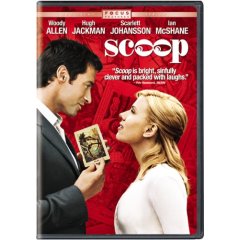 B
B Scoop
Scarlett Johansson, Hugh Jackman, Woody Allen. Written and directed by Woody Allen
Scarlett plays a U.S. college newspaper reporter out to interview aristocrat Hugh Jackman in London. At Woody Allen’s vaudeville magic show, she is “having her molecules disassembled” when a spirit appears to her to say that Jackman is actually the Tarot card killer, a Jack-the-ripper type. She and Woody set out to penetrate the aristocratic life to get the goods on Jackman. It is a completely silly movie, with a steady stream of laugh out loud Woody Allen jokes. I loved the Bergman visual allusion in the beginning. Terrible acting, especially by Scarlett. Could she have been directed that way, to emphasize the comic theme? She looks good though. The story, pace and tempo are like a mix of last year’s Match Point and an older picture, Curse of the Jade Dragon. This is recycled Woody Allen for sure, but the man is funny. I hope he lives forever.
Saturday, December 02, 2006
An Inconvenient Truth: Grade A
 A
A An Inconvenient Truth
Al Gore. Director=Davis Guggenheim; Editors: Jay Lash Cassidy & Dan Swietlik
The film is extremely well-edited, saving Gore from himself. Whenever he speaks more than two sentences with the camera on him, he is boring as dirt. He can’t help it. He goes all stentorian, stating the obvious. The editors only let that happen a couple of times. As for the call to action, it is missing. The thrust of the movie is to demolish global warming skeptics, which it does, but as for what we can do about it, nothing is said. Maybe we are supposed to elect him to find out what the plan is.
Monday, November 27, 2006
Kárzohat (Damnation): Grade A
 A
AKárzohat (Damnation)
Béla Tarr, writer, director. Hungarian (subtitled)
I saw this film at the Northwest Film Center in Portland, OR, on a recent visit. It was Thanksgiving evening and the whole town was locked down except this one film screening. Lucky me. Actually, about a dozen people eventually showed up to watch it. The movie was released in 1988, but I had never heard of it, or the director. It is a plodding “existential” film, shot in low-contrast black and white. The story is perfunctory: a man is in love with a married cabaret singer and schemes to get her husband put in prison. But that hardly matters. The movie is really about the relentless rain, the dimly lit industrial cityscape; decaying buildings; deserted, muddy streets; packs of feral dogs; smoky bars; laconic conversation and doleful music. There is aggressive omission of anything aesthetic; no pictures, flowers, or sunlight; even human bodies are utilitarian, not beautiful. Can people live like that? Hungary under totalitarian rule is palpably conveyed (this was pre-Wall by a year). A recurring image is water seeping over worn stone walls. It takes a lot to wear down stone, but relentless water can do it. The people are stone-faced, their humanity worn away by life in a lifeless society. I loved the photography, the excruciatingly long takes, the way sound and picture are integrated, the Hungarian music, and the sets. This two hour movie should have been boring, but I found it riveting.Sunday, November 19, 2006
Land of Plenty: Grade A
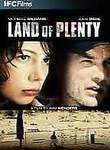 A
A Land of Plenty
Michelle Williams, John Diehl, Richard Edson. Writer & Director: Wim Wenders
The Kid & i: Grade C
 C
C The Kid & i
Tom Arnold, Eric Gores, Linda Hamilton, Joe Mantegna, Henry Winkler, Arielle Kebbel, Yvette Nicole Brown, Richard Edson. With appearances by Shaq O’Neal, Arnold Schwartzenegger, and Jamie Lee Curtis. Dir=Penelope Spheeris.
Sunday, November 12, 2006
The Memory of A Killer
 B
B The Memory of A Killer
Jan Decleir, Koen De Bouw. Dir= Erik Van Looy. Dutch (subtitled).
What a great premise for a movie: A hired killer suffers from progressive alzheimer’s. That interesting theme carries the audience over a lot of clichéd plot devices. The killer (JD) refuses to execute a 12 year old girl, so his boss has someone else do it. He is implausibly offended by this and starts a revenge spree, killing all the middlemen on the way to the boss. He has to get it done before he forgets who they are. Flashback montages convey his memory slipping away. Meanwhile the police are after him too. He has incriminating evidence against the big boss, but forgets where he hid it. Great European locations (Belgium) and the whole movie has an enjoyable European sensibility despite the very dark themes. The acting is uneven, as was the music, and the story line difficult to follow, since characters were not well-rounded and therefore not distinctive. But as far as assassin movies go, this is one of the best.
Saturday, November 11, 2006
Sick & Tired: Grade B
 B
B Sick & Tired
Wanda Sykes
This is an HBO stand up comedy show, the second of Wanda’s that I’ve seen. Her material is very intelligent, funny and socially incisive. Her street syntax and intonation add another layer to the stories that increases their value. A lot of the stories are on socially sensitive topics, like racism, sexism, abortion, homosexuality, and the incompetence of the Bush administration. Her material is far more political than last time, making some heavy handed liberal political “points,” and while still funny, they are more clever than insightful. Perhaps the hot button social topics are already worn thin by the time the comics get to them. I like her best when her material goes surrealistically loopy, like the bit about the detachable pussy. That kind of stuff is totally original, unexpected, satirical, and LOL funny.
The Sentinel: Grade D
 D
D The Sentinel
Michael Douglas, Kiefer Sutherland, Eva Longoria, Kim Basinger
MD is in the secret service assigned to the president’s wife (KB) with whom he has an affair. Meanwhile bad guys of unknown origin (KGB was suggested but there is no KGB any more), for unknown motives (they’re just bad – dark skin, foreign accents, facial hair), want to kill the president. Some other government officials are killed too, with silencers, in broad daylight, just for sport, I guess. Turns out there is a mole in the SS working with the bad guys, for unknown motives. The existence of a mole is revealed by a street informer who has no reason to know it. Everyone has to take a polygraph, to find the mole, and MD fails by lying about his affair. Kiefer heads the posse that closes in on him, so MD does the only sensible thing, goes on the run to find the “real” bad guy before it’s too late. Guess how it turns out. Plenty of gratuitous car chases, sirens, radio-speak and explosions. Lots of loud, meaningless noise. A huge helicopter taking off is not noisy enough – no, there also must be ear-splitting trombones. Of course! Why not turn the volume down? Because then you can’t hear the dialog, which, it turns out, is no great loss. MD is getting too old to be a credible action figure, especially when being chased by much younger guys like Kiefer. The women are only pretty faces. The plot has enough intelligence to be mildly interesting, if you like law enforcement pictures.
Sunday, November 05, 2006
Edmond: Grade A
 A
A Edmond
William H. Macy, Julia Stiles, Joe Mantegna. Written by David Mamet. Director Stuart Gordon
Macy plays a bland, insignificant executive in a large corporation who one day decides to leave his wife out of sheer boredom. Exploring his new freedom, he walks around sleazy bars and strip joints in NYC, engages street hustlers, pimps, and prostitutes. In all this he seems unrealistically naïve about how street life works, and increasingly detached. Finally repressed rage bursts out and he becomes even more dissociative, manic and violent. At the end of the movie the psychosis is gone and he is only eccentric. So the short story is, mild-mannered executive has a psychotic break.
Basing a story around mental disorder is a cheap trick because no ordinary psychological motivation applies. The character can do or say anything because “he is nuts.” Consequently, the story is arbitrary and uninteresting. There is a thin attempt to say that “modern life” causes “basic manhood” to become repressed rage, but that is just cheesy psychobabble. In a DVD deleted scene, we see a fortune teller set up the story as that of Macy’s fate unfolding. I agree that would have been an even less interesting theme than unexplained madness.
Saturday, November 04, 2006
Looking for Kitty: Grade B
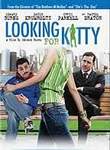 B
B Looking for Kitty
Edward Burns, David Krumholtz. Writer, Director=Edward Burns
Burns plays a not-too-slick private eye in NYC who is hired to find DK’s missing wife. Turns out his wife wanted a divorce and left him because he is an unappreciative, narcissistic, baseball-obsessed bumpkin. In the course of the movie, DK realizes and accepts this. Burns, whose wife has died, comes to accept his loneliness and finally removes his wedding ring. The two men develop a friendship as they each become self-aware. Burns’ character is interested in old NYC buildings whose owners would not sell out to big developers. The implication is that both men are themselves holdouts, resisting change, clinging to the past. The movie is apparently set in modern times but no computers are shown; they drive a 70’s era beat up Ford, and only one clunky cell phone is shown briefly, so you get the feeling yourself of being a holdout against change. Dialog is sharp and witty, and the acting is first class all around, especially some of the quirky gestural moves. Music and photography are excellent. The characters and script are completely original and authentically human. I’m not sure why I don’t give it an A. Something is lacking. Is it too subtle? There is a story, but no plot, maybe that’s it.Sunday, October 15, 2006
The President's Last Bang: Grade B
 B
B The President’s Last Bang
Written and Directed by Im Sang-Soo. Korean (subtitled)
This is a dramatization of the coup d’etat in 1979 in which president Park was assassinated by the Korean CIA. The characters are portrayed as ordinary people with ordinary concerns, bumbling along even as they overthrow the government. It is billed as a satire, and it is comedic, but I think it is actually just a docudrama with a light touch. This topic is apparently still taboo in Korea, so keeping it light was a good choice for the writer-director. The movie gives a glimpse into the Korean culture at the government level. The language, music, and values are interesting. The shoot-em-up scenes are more realistic and mindful than the typical Hollywood cartoon version. Sets and costumes are perfect. The photography is fantastic, and not because it shows beautiful scenery. It is beautiful just because it is done so expertly. You could watch this movie with the sound off and have a very enjoyable experience. But with the sound on, it is also a good story. The only thing it lacks is emotional engagement.
Art School Confidential: Grade B
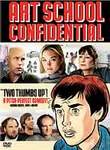 B
B Art School Confidential
Max Minghella, Sophia Myles, John Malkovich, Anjelica Huston, Steve Buscemi. Director Terry Zwigoff
This is a deliciously funny comedy for anyone who has been to art school or for anyone who appreciates the visual arts. A young man (MM) is burning to be “the next Picasso.” His talent is obvious to the audience but in school his portraits are overlooked for stupid trendy work, including “found art” sculpture, meaningless scribbles, and trite pop culture clichés. Each of those pieces is an “in” joke itself. The critical commentary on it all from burned out art teacher Malkovich and the other students is extremely funny. Huston and Buscemi give standout performances in bit parts. MM tries to find his own style and get noticed so he can win the heart of a girl (SM), but to no avail. Meanwhile there is a serial killer stalking the campus grounds and that theme eventually plays into the highly contrived ending. I was really engaged by the struggle to find an original artistic voice and identity. There were so many ways that story could have gone, all the while keeping the jokes flowing. But instead, the serial killer mystery swallows the story and crashes it into a lame clichéd ending. A lost opportunity there, but maybe the filmmakers were afraid the movie was becoming too highbrow. A DVD extra of Malkovich delivering a short speech in three different modes of acting is revelatory. MM’s distracting pouty lips remind me of Gael Garcia Bernal.Sunday, October 08, 2006
American Gun: Grade D
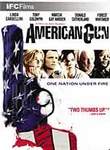 D
D American Gun
Marcia Gay Harden, Forest Whitaker, Donald Sutherland, Linda Cardellini; Director Aric Avelino
Saturday, October 07, 2006
Thank You For Smoking: Grade B
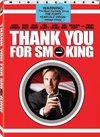 B
B Thank You For Smoking
Aaron Eckhart, Maria Bello, Adam Brody, Sam Elliott, Katie Holmes, Rob Lowe, William H. Macy, Robert Duvall, Cameron Bright. Director Christopher Buckley.
Eckhart plays a tobacco industry lobbyist who is successful and loves his job. The humor of the story comes from his outrageous portrayal of “big tobacco” in a positive, even angelic light. His bull sessions with fellow “Merchants of Death” (gun and alcohol lobbyists) are a scream. His relationship with his son, who wants to learn how to argue to win, adds enough dimensionality to lift the movie up beyond a mere skit. Fine acting all around. The movie is a light satire, not an accusation like “The Insider.” Oddly, not a single character is shown smoking in the whole movie; not even a single lit cigarette is shown anywhere. That’s not really believable, but there is so much tobacco product placement in movies today that the producers either were wary of preserving the moral high ground, or they could not find a tobacco company with a sense of humor that would chip in.Tuesday, October 03, 2006
The Libertine: Grade D
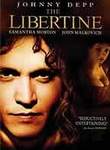 D
D The Libertine
Johnny Depp, Samantha Morton, John Malkovich
This is a dreadful costume drama set in 17th century London. The director used gray and sepia filters to make everything look dark, foggy, smoky, and colorless. Maybe that’s how life was back then, but it sure makes an ugly movie. The story is the hackneyed theater within theater theme. JD writes a play for the king (JM) starring protégé SM. But the play is puerile and prurient sexual material that could hardly hold the attention of an adult, but predictably, the king is offended and clever words are spoken. What saves this murky movie from failure is mesmerizing acting by Depp and Morton. These are towering acting talents who have such skill and presence that they rise above all mud, and they alone make this movie worth having a look.Monday, October 02, 2006
The Proposition: Grade C
 C
C The Proposition
Guy Pearce, Ray Winstone, Emily Watson; Director John Hillcoat
The Australian outback is the stunning location for a story set in the 1860’s of lawmen vs the outlaw Burns Gang, three brothers. The two younger bros are captured, but the middle one is released with instructions to kill the at-large older one, if he wants to save the younger from hanging. It’s an unlikely proposition, and the cops don’t even bother to follow Guy Pearce to learn his older brother’s whereabouts. Emily Watson and Ray Winstone do standout acting as the police captain and his wife, but their roles are pointless. There is lots of bloody violence but it is in context and not offensive. Too many male characters looked and acted alike and I had a hard time telling who was who. Dusty, sweaty scenes with flies around the eyes give a palpable sense of place. Orange filters are overused, probably to (unnecessarily) underline the heat. Still, the movie is above average in beauty. Photography, music, and directing recall Clint Eastwood and Sergio Leone, but the story doesn’t hold up. We never see the outlaws do anything lawless so they just seem like a random bunch of crazy men. There is no cat and mouse tension. Characters are two-dimensional and unmotivated. GP finds his brother and eventually kills him as ordered. The end. There is no drama and the movie is flat. It would be equally enjoyable, even better maybe, with no dialog whatsoever.Saturday, September 30, 2006
Down in the Valley: Grade A
 A
A Down in the Valley
Edward Norton (Produced also), Evan Rachel Wood, David Morse, With Bruce Dern. Director and Writer = David Jacobsen.
Norton plays a psychopathic and delusional, but not floridly psychotic young man who believes he is an old west, gunslinging cowboy, but he actually works dead end jobs in the San Fernando Valley. He meets up with lonely teen Wood, and romance ensues. Dad, played perfectly by David Morse, is a cop and smells trouble, with predictable father-daughter fights. The little brother is frightened by it all. The film starts slowly as these relationships build. I got restless after a half hour but I’m glad I waited it out. Norton’s character is charming and persuasive (as psychopathic personalities often are). Good writing there. He gets deeper into trouble with his delusion, dragging the children along with him, since young people have no clue about mental disorder. All the characters and relationships are pitch perfect. ERW was least convincing to me, but that could have been the clunky writing for that character. The photography is beautiful and the cinematography in general is wonderful, with its surreal juxtaposition of “old west” looking scenes and suburban housing projects. Norton occasionally slips into the slurred speech of the retarded (or CP) character he played opposite DeNiro in “The Score” a few years back, but other than that, he is riveting throughout, sometimes doing a Jimmy Stewart imitation. What a talent. David Morse, a second-tier actor you’ve seen a thousand times, is a real standout in this picture. A haunting movie.


